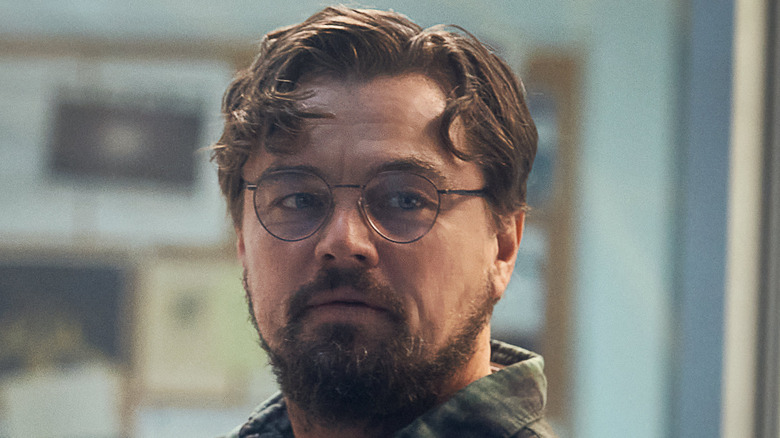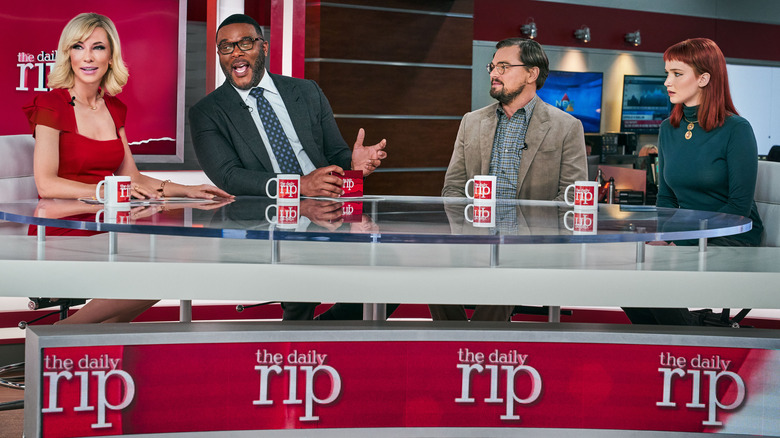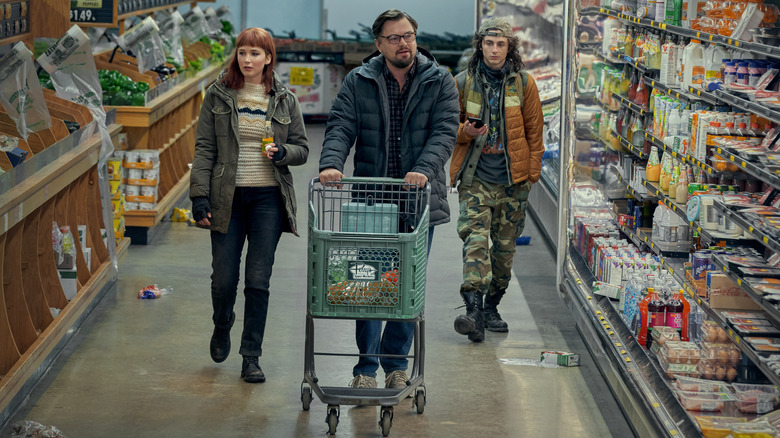Don't Look Up Review: Too Close To Home?
It's been almost ten years since Adam McKay's last straight comedy. The man once responsible for Will Ferrell's unstoppable reign in films like "Anchorman" and "Talladega Nights" has pivoted to a new role as a big screen polemicist, with pictures like "The Big Short" unpacking the '08 financial crisis, and "Vice," revisiting the legacy of George W. Bush. This paradigm shift has made earned him an Oscar, among other illustrious awards, even if it has robbed from the pop cultural landscape one of its most reliable funnymen in an era where most "comedy" comes from incessant Whedonspeak banter in blockbusters and little else.
His newest outing, the satirical, pitch-black sci-fi flick "Don't Look Up," starring heavy hitters like Leonardo DiCaprio and Jennifer Lawrence, benefits from the newfound gravitas his more "serious" pictures have earned, but it's also the closest thing he's made to an outright comedy in ages. But even though the film houses some of the most hilarious moments in any piece of media, film or otherwise, made this year, Netflix is unlikely to effectively market this film the way they do their other comedic investments.
Much of that is the fault of the film's premise and general tone. "Don't Look Up" is about a comet hurtling towards Earth that, for a mathematical certainty, is destined to destroy the planet in six months. Astronomers Randall Mindy (DiCaprio) and Kate Dibiasky (Lawrence), the unfortunate souls who discovered it, are tasked alongside NASA scientist Teddy Oglethorpe (Rob Morgan) with briefing the rest of the world about the impending apocalypse. Too bad for them that no one, especially those in power, really want to address the issue at all.
There's not a lot of subtlety at play here. "Don't Look Up" isn't about a fictional comet. It's about the very real climate crisis and the indisputable fact of the chasm between what we know, for a certainty, to be on the horizon for humanity and what we, as a people, are utterly unwilling to do about it. As such, McKay and co-writer/Bernie 2020 campaign vet David Sirota are able to dial the absurdity up to 11 to mine the general concept for laughs, making it an excellent delivery system for the film's superb cast to cut loose and get weird. But it's also a film about rage. It is a bitter, insolent and smug screed, too long and too light on demonstrable action items for the audience to act on once the credits begin to crawl.
"Don't Look Up" is an exhausting, terminally caustic exercise made by and for sullen doomers who don't know what the hell we're going to do with our alleged future. It's exactly the sort of movie no one wants to watch on the eve of Pandemic Year Three... which is exactly why it's so necessary.
We're all gonna die!
The first half of "Don't Look Up" captures the twin paths of the "normie to doomer" pipeline with startling efficacy. The brief opening sequence, complete with Lawrence's Dibiasky rapping Wu-Tang lyrics to herself while monitoring a massive telescope, tracks the discovery of the comet and the ensuing number-crunching determining its trajectory. As Professor Mindy works on the white board with his students and realizes this thing is headed straight for them, both he and Dibiasky descend into crippling, craven anxiety. They make some calls and after being paired up with Oglethorpe, must fly to DC to brief the White House. There, they wait an entire day outside the Oval Office waiting to speak to President Orlean (Meryl Streep) and her idiot son Jason (Jonah Hill), who doubles as her Chief of Staff. The denial, the minimizing, and the utter ignorance on display cause our two leads to spiral in two different directions.
The younger, shrewder Dibiasky, who makes it a point of pride to let Orlean know she didn't vote for her, immediately recognizes that this administration, and truly the entire establishment, are content to pretend this problem doesn't exist, or that it's nowhere near as catastrophic as it is, in order to maintain the status quo. They may hide behind doubts at Mindy and Dibiasky's credentials, but it wouldn't matter who delivered the news. "The world is ending" doesn't trend. It doesn't poll well. It's not conducive to amassing, or maintaining, power. So from the outset, she sees that we all are doomed but dedicates herself to trying to figure out other solutions anyway.
Mindy, a lifelong wet blanket with no backbone, is seduced by proximity to power. He's co-opted both figuratively, by the lure of the administration's interest in using him (and his hidden good looks) to legitimize their half-hearted efforts to defeat the comet, and literally, when he begins cheating on his wife (Melanie Lynskey) with a sociopathic morning show host played by Cate Blanchett. Mindy tries in vain to change things from the inside before inevitably becoming everything he stands against.
Though the film is anchored by these two perspectives, and the A-list stars bringing them to life, it also possesses a kaleidoscopic ensemble of big names doing their best to steal the show in smaller parts. There's Kid Cudi and Ariana Grande as a pair of star-crossed pop star lovers both poking fun at their real life personas. Ron Perlman makes an impression as a parody of every right-wing PR disaster dinosaur who can't stop spewing racist and sexist bile to save his soul, even while on a suicide mission to fight a comet. Michael Chiklis is a delight as a conservative pundit in his scant few moments.
But really, it's Mark Rylance who walks away with the movie as Peter Isherwell, a haunting simulacrum of the late Steve Jobs with shades of every other tech CEO who puts profit over people. His bone white hair only outshone by the blinding ivory of his veneers, Rylance makes Isherwell a laughable parody of a public figure type we have far too many of as well as a chilling portrait of villainy when he uses his power and influence to thwart even the vaguest hope of humanity surviving the inevitable.
That doesn't sound like much of a comedy, huh?
Speaking truth to power
In his last two films, McKay was able to use a spoonful of sugar to get audiences to digest some uncomfortable truths. "The Big Short" felt more like a "For Dummies" book than a narrative film exercise, packed to the brim with fourth-wall-breaking asides and celebrity cameos to explain complicated economic concepts. "Vice" employed similar stylistic tactics, embodying and mocking the biopic structure we all know and loathe for comedic effect, while still imploring the viewer to reckon with the utter monstrosity of Dick Cheney at a time when Trump-sick folks were unironically saying they missed "Dubya."
But the humor in "Don't Look Up" feels so different. Sure, McKay has smartly eschewed the YouTube video essay/Vox explainer aesthetic he'd fallen into for something aiming more at the agitprop of Stanley Kubrick's "Dr. Strangelove" or Sidney Lumet's "Network." The kinship isn't so much visual or stylistic. McKay is not the director either of those titans were, nor is he a writer with the caliber and lunacy of Paddy Chayefsky. But what he and Sirota are is mad as hell. This is a depressing and futile exercise if it's thought of and engaged with like a call to arms or some kind of last-ditch effort to radicalize the casual moviegoer about the degrading material conditions they live within.
"Don't Look Up" is an excoriating trauma dump of a film that may ring false to those who find McKay's new modus operandi to be little more than the indulgent flailing of a super-rich comedian. But there's something genuinely cathartic in a movie this blunt, this bleak, and this raw. The laughs to be had are all of the gallows variety. No other recent mainstream film has so closely resembled the sort of bone-chilling dryness that comes from in-jokes with close relatives at a funeral, only it's not a loved one who has died, it's the hope for a future somehow untouched by capitalism's gorilla grip on the notion of progress.
Perhaps instead of lambasting McKay for not having fun anymore, we should collectively thank him for being one of the few major voices in comedy actually doing the work of punching up. The targets in McKay's films of late have been the rich, the powerful, and the oppressive, while many of his peers, especially the ones Netflix promotes, are content to lament "cancel culture" and take their jabs at trans people, zoomers, and the destitute.
We all miss the escapism McKay's older work provided, especially in times like these, but maybe that absence is just indicative of where the world is now.
We have no Cash, no Hope, and no Jobs, but it feels especially painful that we have no Ron Burgundy either.


